
Taken from The Official Book of Homeschooling Cartoons Vol. 1 - by Todd Wilson www.familymanweb.com
"Mater" (Latin: mother) "Magistra" (Latin: teacher)
How... simple! And how I think I've lost sight of this. As they have gotten older, and the curriculum has, of necessity, gotten more demanding, I think I've lost some of the simplicity of my approach in those early years.
In applying the above three goals to our days I want to concentrate on:
So... as I go forward with our plans for the new year, I'm going to reread parts of Andreola's book and try to "Masonize" our studies as I did in years past. If you've never studied her approach or read her books, I encourage you to read "A Charlotte Mason Companion" or read some of the websites dedicated to her philosophy. (A great place to start is the FAQ's here. I am particularly drawn to the booklists on this site.)

I cannot say enough how much I love the co-op that my friend and I have. It is small. Small. As in, two students- my daughter and her best friend. When you say "co-op" in homeschool circles it usually connotes a group of at least 3 or 4 families. I know of one co-op in our area with 150+ kids! That's great if that fits your needs, but I just thought I'd share what we've found that works, why I feel it works so well, and how we do it.
The first reason I think our co-op works so well is that it came as a direct result of prayer. God brings about things that work! We had been in a couple of co-ops that had 5-6 families in them, and for various reasons, though we enjoyed them immensely, I didn't feel they would be a good fit academically as the kids got into the upper grades. (Someday maybe I'll post why, but today I'm focusing on our current co-op situation.) I pulled out of co-ops altogether and spent a year praying about it, resigned to the fact that we just might not do co-ops anymore. Then God brought this current situation about last year. It all started with one subject: science. They met one afternoon a week and did the experiments that went along with the chapters in the BJU Science 6 book. We knew the girls would benefit from working with someone else and we were pleasantly surprised at how much they got accomplished and how much they truly enjoyed it. So, at the end of last year we decided we'd add some other subjects to really make their time count.
The second reason it is so functional is that the other mom and I are very much on the same wavelength, both in our worldview and in our educational philosophy. When we meet to plan, it's almost funny to me because as one is talking the other one is nodding in agreement. Wow! That doesn't always happen in co-op meetings!
The third reason it has been such a blessing is because our girls work extremely well together. They are not the same learning style, and they have different strengths, but because of this they compliment each other. When one gets off task or distracted, the other one reigns her in. Where one is artsy, the other is strategic. Where one needs help getting motivated, the other shows organizational strengths that are a great model. Sometimes they take turns playing those various roles, but the end result is that they are both built up. It is a really good match because, as a result of working together, they are both better.
Here's the basic structure of it:
They are doing four subjects together this year:
We chose the first two subjects, Literature and Science, because we just wanted to partner up on so that they would enjoy it more, and because we feel that those are core subjects that it would benefit us to have someone sharing the load in planning and teaching. The second two subjects were those that we knew might fall through the cracks in our own homeschools without the accountability of a schedule and someone else with whom to plan and teach them.
Over the summer we decided on our subjects and we each took 2 to plan for the year. We met together once we had planned how to spread the chapters/ lessons out for both semesters, to make sure the projects were evenly distributed. My friend keeps a three-year-old, and I have a son to homeschool as well, so we swap off houses each week. We have a gas station that's exactly between our two houses, so we meet there in the morning and whoever has it at her house that week takes the other girl home. I teach the current Science chapter, go over their Literature with them, discuss our Texas History chapter and facilitate the IEW Writing dvd lesson. My son does his independent work while I'm teaching the girls, and they are so self-sufficient that while they are getting their chapter projects done or doing their questions or writing assignments I can work with my son. The weeks that they meet at my friend's house, they do more of their independent work/assignments and she facilitates their Science experiments. I am in another small co-op with 2 other families that meets biweekly on the weeks I don't have the girls' co-op at my house.
I couldn't be more pleased with how it's going this year. Today is our last co-op day before Christmas, and I feel it's been a very successful semester. We've covered a lot of ground in their subjects and the girls have worked extremely hard. We have raised the bar this year, and they've really risen to the task. We've kept each other accountable in some key subject areas and I've seen a marked improvement in my daughter's approach to her schoolwork.
There are as many different ways to co-op as there are co-ops, so I thought I'd share how it's working for us. If this sounds like something that might work for your family, I encourage you to begin praying specifically about it for next year, asking God to place a like-minded, easy-to-work-with family in your midst and and ask Him to begin speaking to their heart about it as well. I've experienced first-hand how He'll tailor- make a co-op that's a perfect fit!
 I'm always doing internet searches, reading internet message boards, or looking for someone's name on a huge address spreadsheet on my computer. It's hard sometimes because when I click on a site there might be a huge article and I'm looking for one specific word, or a bunch of recipes when I'm looking for the one that says "banana" in it. In the case of the Well-Trained Mind boards, I might be trying to follow a certain thread or want info on a particular curriculum.
I'm always doing internet searches, reading internet message boards, or looking for someone's name on a huge address spreadsheet on my computer. It's hard sometimes because when I click on a site there might be a huge article and I'm looking for one specific word, or a bunch of recipes when I'm looking for the one that says "banana" in it. In the case of the Well-Trained Mind boards, I might be trying to follow a certain thread or want info on a particular curriculum. One of my favorite discoveries (which everyone else may already know about, but I'm slow) is the "CTRL F" key. In a page full of text, if you're looking for a certain word or piece of information, all you have to do it hold down the "control" (ctrl) key and the F key, and a little screen pops up asking you what word you want to find. You just type it in and it highlights it on the screen for you.
It works for me!
For more great tips from some super-smart moms, visit Rocks In My Dryer.
Have a great Wednesday!
 We've been seeing "Africa" everywhere! We are in the midst of praying about our mission work for 2007, and talking about how much we miss Ghana. It's been SO on our minds lately. (We were able to go as a family in 2004 and 2005.) I was at a friend's house recently and she has a marble globe on her coffee table. I was standing over it and glanced down, and the continent of Africa was facing directly up at me. A few days later I was at a gas station, and there was a huge grease spot on the ground, in the perfect shape of Africa. (The kids confirmed it as well!) Yesterday we were at an ice skating rink which was surrounded by glass, and Kyle skated over to me and said, "Mom, you've gotta come see this!" I skated around to where he had been and there was a continent-of-Africa-shaped crack in the glass. Really! I wish I would've taken a picture.
We've been seeing "Africa" everywhere! We are in the midst of praying about our mission work for 2007, and talking about how much we miss Ghana. It's been SO on our minds lately. (We were able to go as a family in 2004 and 2005.) I was at a friend's house recently and she has a marble globe on her coffee table. I was standing over it and glanced down, and the continent of Africa was facing directly up at me. A few days later I was at a gas station, and there was a huge grease spot on the ground, in the perfect shape of Africa. (The kids confirmed it as well!) Yesterday we were at an ice skating rink which was surrounded by glass, and Kyle skated over to me and said, "Mom, you've gotta come see this!" I skated around to where he had been and there was a continent-of-Africa-shaped crack in the glass. Really! I wish I would've taken a picture.
 This cartoon absolutely cracks me up! It's one of my favorite ones from Todd Wilson's cartoon book. I love it, because it illustrates that no matter how perfect some people may appear, there's a possibility that they are just like me (and boy, have I resembled that mom before!) But, why do I need to know that? Why do I need to think that others are not as perfect as they appear? If they were that perfect, would it be any skin off my nose, really?
This cartoon absolutely cracks me up! It's one of my favorite ones from Todd Wilson's cartoon book. I love it, because it illustrates that no matter how perfect some people may appear, there's a possibility that they are just like me (and boy, have I resembled that mom before!) But, why do I need to know that? Why do I need to think that others are not as perfect as they appear? If they were that perfect, would it be any skin off my nose, really?
When I read the November Epistula letter the first time, I thought "Oh my gosh! I could never do all that. I'm a slacker compared to her! My poor kids!" The second time I read it I thought, "Good for her. She's found something that works for her." The first time I read it I read it through the lense of my own insecurity. The second time I read it, it was from the position of one who is confidently doing what I know I'm supposed to be doing, in a way that honors the One Who called me to do it, and glad that someone else is doing the same. Either way, it wasn't her deal, it was mine! Her words and thoughts on the page (screen) never changed. But the way that I read them did. A fellow homeschooler telling what works for her and how great her homeschool is functioning need not "touch a nerve" at all! In fact, I submit that if it does, that nerve was already exposed. The key is to figure out why it's exposed. The enemy can get our nerves exposed for the purposes of causing pain and doubt, and with the eventual goal of pulling us away from our purpose and calling. Our Heavenly Father allows our nerves to be exposed for the purposes of healing, correcting, and building us up and filling us so that we can press on for His glory. If you read another's success story as a condemnation of your own circumstances, that's from the enemy. If you read it and are convicted that you could do better, or feel confirmation that you're on the right track, that's from God. Condemnation weighs you down and conviction pulls you up. Because in my experience, conviction is always accompanied by hope. Hope that it can be better, and hope in the One who can make it so. He promises to! I can't tell you how I've clung to the verse, "The One Who calls you is faithful and He will do it." If He's calling me to it, He'll equip me for it! I could tell by the reactions to the letter on the Well-Trained Mind boards back in November who was feeling condemned, convicted, or confirmed by her letter.
About the second letter, the December edition. If the November letter hadn't "touched a nerve" with me (which it really hadn't), the December one did. Beginning with the inference that they are the dentist and the reader, the patient. Condescension aside, I had to read it as what it is- an advertisement. Like any advertiser, they must create the need for their product or service before the consumer will be prompted to purchase it. What better way than a testimonial? While the initial letter may have not been meant to point out the lack in many homeschoolers, the fact that it was taken that way by some readers served as a perfect opportunity to point out that they (Veritas) have what those homeschools need. I can't blame them. They are not a ministry, they are a business. They have a product to sell. Just like Coke has to convince you how thirsty you are. Could you quench that same thirst with water? Of course. But they're banking on the fact that you'll quench it with Coke. Veritas is hoping the same thing. Once the reader is sufficiently convinced that her homeschool is woefully behind due to her lack of 50+ hours Veritas teacher training, she can then download it, listen to it, and be directed as to how she can purchase what she needs (from them) to bring it back up to par. And really, is there anything wrong with that? It may be that the seminars are just what that mom needs, and that the materials might just be a perfect fit for her children. We have used many Veritas products and/or recommendations over the years and will continue to do so. (Just like I've had my fair share of Cokes over the years!)
Going with Coke example, though, I must tell you that I am a Diet Dr. Pepper girl. That's my preference and my taste. I am not a straight-Veritas homeschooler, either. So, hearing how a mom incorporates the Veritas Teacher training and it has revolutionized her homeschool need not make me feel I should abandon my methods and materials and do the same. Again, good for her. God's plan for her family is different that His plan for mine (in the specifics). In the broader sense, it's the same- conforming us to Christ's image and calling us heavenward. How He chooses to accomplish that in each of our families looks different. If you read something that convicts you, pray about it. (Pray 1 Thessalonians 5:24!) If it burdens you, reread it in a God-given spirit of confidence (not defiance) and see if there's anything you can use. If it's total condemnation or condescension, weighing you down, trash it. (The same words can be used either way- the enemy can use words that help some people to totally mess with others!) Either way, don't give up. It's not a sign that you're not cut out for homeschooling.
Press on!
...and ponder what I've been pondering these past few days!
I receive the Veritas Press Epistula (newsletter) in my email box each month. The December one refers to the November newsletter having "hit a nerve," which the current letter seeks to "medicate." Well, I had to look up the November one as I had not read it (probably too busy ::ahem:: teaching my kids ::hairtoss:::. or blogging...) so I am posting it here for your reading pleasure in the event that you missed it as well or aren't a subscriber. (As of this posting neither edition is available on their website.) In case your nerves are hit, feathers are ruffled (or any other overquoted idiom) I am also posting the December follow-up so you can feel better.
(Oh, and once the "medication" wears off I'll post what I think!)
Enjoy!
~~~~~~~~~~~~~~~~~~~~~~
November 2006
Need medication yet? Well, here it is:
December 2006
-------------------------------------------------------------------
How Much is Enough?
About one week after sending out the November epistula I told my wife that we needed to scrap any plans for a Christmas oriented lead article to answer questions resulting from the Musings From a Mom article of last month. It seems the author hit a nerve. And, like any good dentist who hits a nerve while drilling, we thought it wise to medicate.
There were several statements made in the article that we received comments on, but they generally focused on this:
Homeschoolers Are Behind: It was surprising to hear that Veritas Academy often tests homeschoolers for admittance and finds them lacking. We all think our children are brilliant and several grade levels ahead of where they “should” be. Apparently this is not so. More homeschoolers must hear that.
Some responses and questions asked for clarification. Others pointed out weaknesses or different sets of facts, such as having many more children to teach, as many of you do. Still others suggested that we were throwing a guilt trip on you. One even suggested that a testimonial-type article lacked credibility in an academic journal. I’m flattered that epistula was called an academic journal, but I don’t think the description fits. Our purpose is to be informative and motivational as well as interesting—not just an academic journal.
In the remainder of this article I’d like to address what seems to be at the bottom of all the responses. It is probably best characterized by an excerpt from one of them:
I find myself more and more sensitive to whether I’m doing “enough,” doing it “right” with my dd [deardaughter], etc. What to you all seemed like a limited example has stirred up quite a bit of confusion in our classical homeschooling circles.
The problem is fairly simple. You have chosen to homeschool. Some are not trained as a teacher. You are told you can do it (and we believe you can, too). You believe you can, and you start. You get caught up in the details and at some point you think, “How much is enough?” By the way, this question is one that schools ask themselves, too. And they should.
The question keeps begging an answer. How much IS enough? How much is ENOUGH? And you feel some guilt because there is always more that can be done. There is always someone else doing something that you are not, and you wonder if you should. Again, schools feel this pressure, too.
The first thing we really must consider is the fact that each situation is different. All other things being equal, a family with five children cannot educate with the same level of individual attention that a family homeschooling one child can. Naturally, this makes a difference. Another factor is money. A family that can afford to take their third grader to Italy and Greece should be more effective teaching about Ancient Greece and Rome, the Gospels or Acts through Revelation than a family who cannot afford such a trip. Geography also plays a part. Being located near Gettysburg, Washington, Philadelphia or Boston poses great opportunity for field trips to aid teaching Explorers to 1815 or 1815 to the Present.
We all make choices. I can’t imagine anyone moving from Omaha to Boston to give their child more access to field trips aiding the teaching of early American history. There are other factors that outweigh such a move. When we print an Omnibus text book, we have five to six people proofread. We know even that is not enough, and we will have some typographical errors come through in the final version. But we can’t afford the more extensive proofreading done by much larger publishers. In other words, we accept the fact that it won’t be perfect. Yet we recognize that it is better to do it imperfectly than not do it perfectly. School is like that. In fact, I have commonly said, “Anything worth doing is worth doing badly,” when asked how we got started, not having been educated classically ourselves. The alternative to not doing it is, well, not an alternative.
Schools and homeschools are faced with similar choices. You cannot do it all. A typical family homeschooling, say, three children can’t reasonably expect to do as thorough a job teaching three different tracks in every discipline with one set of parents teaching as a family with one child. Furthermore, homeschooling has some built-in differences from a school. Many parents are teaching without having been trained to teach—that is tough. Is it offset by the fact that the parent loves the child more than any teacher can? Sometimes. Sometimes not.
I commend you for choosing to give your child a Christian education—in school or at home. That is the first and foremost issue as far as I’m concerned. Christians have no business having their children educated by agnostic institutions and then wondering why they don’t faithfully follow the Lord. This should be non-negotiable.
What is negotiable is, “How much is enough?” But we must be prepared to make these choices. And we must figure out a way to do them both honestly and guilt-free. Basketball or Algebra? Piano or Physics? Are they even either/or questions?
My wife, Laurie, has made the comment that many homeschooing families coming to Veritas Academy are behind. It seems that needs clarification. Someone asked if homeschooling families that use Veritas Press curriculum are also behind when they seek to enter the school. Some are, some aren’t. They do tend to be better prepared. It is also true that many children coming from other schools are behind. It is not unusual for a child to be a year or two behind in math. It is also true that some homeschooling children will have been exposed to things that children at Veritas have not because their family deemed it as important. The point that she was making with her comment is this: schooling children, whether in school or a homeschooling situation, is HARD, HARD work. It requires diligence. When a child is in a situation where a teacher is constantly critiquing their writing, making them redo their math problems, etc. they generally move ahead quickly—school or homeschool. When a teacher assigns a test for Friday, they do not care if Jimmy was out late last night at a baseball game, Jimmy still has to take the test and so Jimmy continues to move ahead. You should know we love homeschooling. If the impression was given that we think school is definitely better that is not the case. It is not that simple. When our oldest was in third grade and homeschooled he was able to do two years of Saxon in one year (A friend of Laurie’s trained as a CPA was teaching him math). This enabled him to be on a track to be complete Calculus in tenth grade and Calculus II his junior year. In his senior year he took Calculus III and Linear Algebra with Differential Equations at a local university. This was hard work. Not only did he do all his other disciplines, but he spent about two hours a day on math. This has proven to pay great dividends—some in cash. He got a tremendous academic scholarship to study Materials Engineering and has continued to be blessed with incredible opportunities at college.
We frequently hear that schools waste time—that you ought to be able to do your school day in a few hours a day. Whether in school or at home, work is work; it all depends on how you use the time.
So, where do we get academic standards that tell us, “THIS is enough!”? We think that looking to better educational times historically is wise. We think looking at present day success cases is helpful. In our work we have looked at historic examples, examples from other cultures and, of course, our own circumstances. All this has led to the levels of accomplishment that we recommend in our catalog and on our web site. But we must realize that a rigorous academic education is not everything. It has been very important to me to give my children a well-rounded education that includes athletics and the arts. They have benefited greatly.
As I write I can still sense some frustration. You still want to know, “How much is enough?” Yet, I hope you can see that I cannot provide a simple, one-size-fits-all answer. The answer, frankly, is “It depends.”
Here at Veritas Press, we desperately want to help you as much as we can. We purpose to help parents and schools to raise a godly generation that is better educated than we, that is more capable than we. And that is helping to move the world—individuals, communities and nations—in which we live to a right relationship with their Creator. And we think that a rigorous classical Christian education balanced with other very important matters is an integral part to that end.
In the Free Offers section below you will find a free link to a talk I did on Academic Standards. I think it will help “set the bar” for you.
We have also given much thought to offering a service to homeschools and schools that would be far more extensive than our consulting service. Our discussions have included ideas like on-going consulting, test and paper grading, curriculum design and implementation techniques, certificates of completion for any given grade and even a degree program for graduation from high school. We’d like to hear from you. Would this be helpful? Would it help you know, “How much is enough?”
It is not our purpose to send you on a guilt trip. However, it is our clear and express purpose to recognize that the educational standards of today are quite slack when weighed in the balance of history and student capability. And we want you to join us in doing something about it to the glory of God.
Marlin Detweiler
Oh, don't worry Mr. Detweiler. Most homeschool moms I know have plenty of stamps in their emotional passports from the many "guilt trips" we've been on. If your letter sends me on another one, it's because I was already on board the ship...
I'll post more thoughts in the coming days. :)

 Last weekend, we "decked the halls" around our house, preparing for our week of Thanksgiving-week camping. Words cannot express how great it felt yesterday to drive back into town listening to Christmas music on the radio, knowing that when I walked into my house I would see the stockings hung by the chimney with care!
Last weekend, we "decked the halls" around our house, preparing for our week of Thanksgiving-week camping. Words cannot express how great it felt yesterday to drive back into town listening to Christmas music on the radio, knowing that when I walked into my house I would see the stockings hung by the chimney with care! Give yourself an early Christmas gift... look at your schedule and your lesson plans and see what you can "unhook" from. Then you won't be strung out like the Christmas lights, and you just might shine all the brighter during the holidays!
Give yourself an early Christmas gift... look at your schedule and your lesson plans and see what you can "unhook" from. Then you won't be strung out like the Christmas lights, and you just might shine all the brighter during the holidays!
 I posted on my other blog that we will be gone for the week.
I posted on my other blog that we will be gone for the week.and think, "Oh, good. It's stuff we already have on hand..."
:)

 ... cosmeo.com yet? We have had a trial membership for about a month now, and I have decided we will subscribe because it is proving to be worth the $8.85 (two medium Starbucks!) a month.
... cosmeo.com yet? We have had a trial membership for about a month now, and I have decided we will subscribe because it is proving to be worth the $8.85 (two medium Starbucks!) a month. We spent the morning defending the Alamo, and that can really wear a person out!
We spent the morning defending the Alamo, and that can really wear a person out! I'f I've done my cutting and pasting on Friday (which, thankfully I did this week!) then Sunday afternoons find me "grading and replacing." I grade the previous week's work and replace it in their weekly binders with the current week's assignments. I've been trying to stay better about going through their work daily, so I've been having them pull their completed work out of their binders each day and put it in their bins, and then I grade them as I
I'f I've done my cutting and pasting on Friday (which, thankfully I did this week!) then Sunday afternoons find me "grading and replacing." I grade the previous week's work and replace it in their weekly binders with the current week's assignments. I've been trying to stay better about going through their work daily, so I've been having them pull their completed work out of their binders each day and put it in their bins, and then I grade them as I  It's Friday afternoon! Time to cut and paste!
It's Friday afternoon! Time to cut and paste! "E Pluribus Unum." "One out of many," (or literally, "Out of many, one.") Before I had ever cracked open a copy of Minimus or my (now-well-worn copy of) The Complete Idiot's Guide to Learning Latin , I recognized that Latin phrase seen on the Great Seal of the U.S. A few weeks ago it was our phrase in our Latina Christiana lesson. More recently it was seen on the quarters that I paid my kids for their Latin memory work! Yes, I decided (or should I say resorted) to paying them 50 cents a sheet for their Latin recitations. I know, I know... paying for grades or performance is frowned upon by some. I read Punished by Rewards a few years ago and agreed wholehearedly with Kohn's premise that rewarding students for learning can reduce it to a chore or something in which they won't see the inherent value. Imposing a value or reward on it might imply that it doesn't possess any merit on its own.
"E Pluribus Unum." "One out of many," (or literally, "Out of many, one.") Before I had ever cracked open a copy of Minimus or my (now-well-worn copy of) The Complete Idiot's Guide to Learning Latin , I recognized that Latin phrase seen on the Great Seal of the U.S. A few weeks ago it was our phrase in our Latina Christiana lesson. More recently it was seen on the quarters that I paid my kids for their Latin memory work! Yes, I decided (or should I say resorted) to paying them 50 cents a sheet for their Latin recitations. I know, I know... paying for grades or performance is frowned upon by some. I read Punished by Rewards a few years ago and agreed wholehearedly with Kohn's premise that rewarding students for learning can reduce it to a chore or something in which they won't see the inherent value. Imposing a value or reward on it might imply that it doesn't possess any merit on its own.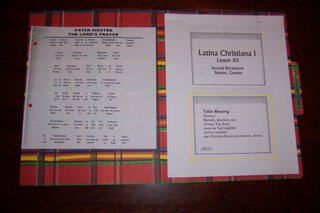 carry around, stick in the car or flop open during our recitations without having to flip through their workbooks. They do great during our Latin "class" time, but weren't very successful as of yet with memorizing the different endings for the cases and declensions which are required for the work going forward. SO, one day I said, "Okay. 50 cents a square. Let me know when you're ready so I'll have my coin jars with me." Within a few days, there they appeared, folders in hand. One and then the other presented his or her folder and began reciting page-after-page of Latin prayers, cases, declensions and conjugations. One earned $6. One earned $6.50. We're moving on in Latin. Life is good!
carry around, stick in the car or flop open during our recitations without having to flip through their workbooks. They do great during our Latin "class" time, but weren't very successful as of yet with memorizing the different endings for the cases and declensions which are required for the work going forward. SO, one day I said, "Okay. 50 cents a square. Let me know when you're ready so I'll have my coin jars with me." Within a few days, there they appeared, folders in hand. One and then the other presented his or her folder and began reciting page-after-page of Latin prayers, cases, declensions and conjugations. One earned $6. One earned $6.50. We're moving on in Latin. Life is good!
 Luke was making us pancakes Sunday morning when he decided to try his hand, er, ladle at fashioning our great state. Of course, it was picture-worthy. And big! The kids decided to share it. When I asked Bethany how I should divide it, she said, "I'm only hungry enough to eat the Coastal Plains."
Luke was making us pancakes Sunday morning when he decided to try his hand, er, ladle at fashioning our great state. Of course, it was picture-worthy. And big! The kids decided to share it. When I asked Bethany how I should divide it, she said, "I'm only hungry enough to eat the Coastal Plains."
 It is SO great to co-op with a good friend! I just spent the afternoon with my dear friend, whose daughter co-ops with my daughter for four subjects: science, writing, Texas History, and literature. We have had a wonderful start to our year so far, meeting one day each week, but the science the girls have been doing has been all-consuming.
It is SO great to co-op with a good friend! I just spent the afternoon with my dear friend, whose daughter co-ops with my daughter for four subjects: science, writing, Texas History, and literature. We have had a wonderful start to our year so far, meeting one day each week, but the science the girls have been doing has been all-consuming.Guess what? I've gone back to school this year! No, not graduate school (although I've been known to order university catalogs and peruse them, just for fun). Not seminary (though we were on a seminary campus not long ago and I got tingles just thinking about how great it would be to be a student there). Actually, it's the same school my kids attend, just "down the hall," so to speak. I've begun my own coursework this year, and I love it.
I have always learned so much right alongside my kids as I homeschool them. In our cycles through world history I have caught so much that I missed the "first time around" in my own schooling. I have fallen in love with books and authors, both familiar and well-loved from my own childhood as well as those which are new to me. That's why the subtitle to this blog is the familiar-to-educators quote, "To teach is to learn twice." A resounding theme among my fellow homeschooling colleagues is how much we ourselves are being educated as we facilitate the education of our children.
My kids are increasingly independent, and there are books/ subject areas of interest to me, but for which they either aren't ready, or there currently isn't room in their schedules. I have always kept a Bible study going, whether it was BSF, Precepts, Beth Moore, or my own study (using the techniques taught in those studies.) Even when my kids were babies and young children, I carved out and vigorously guarded my time for Bible study. It's been a lifeline to me! Over the years I have also tried to set aside time each day (even if it was only 5 minutes) to read books about parenting, education, child development, or other areas which I consider to be "continuing education" for me in my "chosen field" as a parent and home educator. One of those books, which I read back in 2003, was The Well-Educated Mind by Susan Wise Bauer. I was inspired at the time to pursue the "classical education I never had," but it just wasn't the season in my life to add to what I was already tackling, so I put it back on the shelf and waited. This year as I was praying through our school year, I felt God nudging me to think about adding some material just for "me." Time to kick it up a notch!
The first thing I added was Greek. 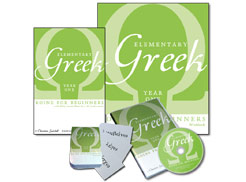 I have chosen the curriculum Elementary Greek by Christine Gatchell. I love it because it is exactly that- elementary! The first week I learned how to write the Greek alphabet (way harder than the capital Greek letters I learned during my sorority days!) as well as learn what sound each letter makes. I have begun learning to read words and memorize scripture. I have loved carrying my flashcards in my purse to look over while I wait outside the kids’ activities, and I put the audio on my iPod which has really helped with the memory work. This weekend our family heard a pastor quote John 1:1, and I was able to say it to myself in Koine Greek. Too cool!
I have chosen the curriculum Elementary Greek by Christine Gatchell. I love it because it is exactly that- elementary! The first week I learned how to write the Greek alphabet (way harder than the capital Greek letters I learned during my sorority days!) as well as learn what sound each letter makes. I have begun learning to read words and memorize scripture. I have loved carrying my flashcards in my purse to look over while I wait outside the kids’ activities, and I put the audio on my iPod which has really helped with the memory work. This weekend our family heard a pastor quote John 1:1, and I was able to say it to myself in Koine Greek. Too cool!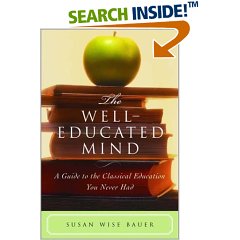
I have also begun systematically reading through classic literature, using the aforementioned book, The Well-Educated Mind as my guide. I’m not following her sequence exactly, but pretty closely. I actually started using it last year and only got through part of Don Quixote and Pride and Prejudice. This year I have been reading The Pilgrim’s Progress, which I started while Kyle was reading Dangerous Journey. Yes, Pilgrim’s Progress was written in the mid-1600’s, and yes it is hard for me! But I’m finding it interesting, and it really is considered a pivotal book in Christian/church history.
Additionally, a friend approached me a couple of weeks ago at a homeschool association meeting and asked me if I would be interested in joining our community band. She herself has recently joined and is really enjoying it! She asked me what I had played in school, and when I told her it was the French horn, she said they really need some. SO… last week I polished up my horn and began playing again. My face feels as if it might fall off, but I actually sound pretty good! So, I start band practice next week. Just in time to prepare for Christmas concerts. Ho Ho Ho!
So my class “schedule” for this year looks like this:
Bible
Education/ Child Development
Greek
Classic Literature
Band
I work through my Bible study in the mornings after my quiet time. I have time set aside 2-3 days a week to work on my "school." I also take my books along as I wait while during the kids' respective activities. I have no preconceived notion of how quickly I’ll work through any of my books, because… it doesn’t matter! That’s what’s so great! Also, as the kids' subjects get harder for them, it's been good for them to see me work on something that's hard for me. I showed Bethany my Greek workbook the other day with my carefully-copied words and letters and she congratulated me on my hard work. While Kyle is working his way through a challenging book, he can see me doing the same.
I want to close by saying that if you’re reading this and feel in the least bit pressured because you aren’t learning Greek, reading classics, or playing an instrument… STOP. Order the book Lies Homeschooling Moms Believe by Todd Wilson, immediately! Let that be your book study for this year. As homeschoolers we are already tackling something enormous by educating our children at home. The thing we don’t need some days is to read or hear about how a fellow homeschooler: is making or saving thousands of dollars each year/scrapbooks everything her family does/ grows all of her own food/cooks everything from scratch/ lost 25 pounds/ redecorated her entire house/ keeps her husband happy/ is finishing all of their curriculum/ plans fabulous field trips for her children/ is learning Greek. No matter what we read about how others run their homeschools, we tend to compare their (perceived) best with our own (known) worst. But, we must not do that! There are many days and weeks when homeschooling my children pushes me to my cerebral limit. But, my two (only two) children are older and more independent now. I’ve had the desire to take classes for awhile, and this is the way that works best for me. I hope if you’re thinking it would be fun to do something similar, this has given you some ideas on how to get started.
Happy learning!
 A pirate map Kyle made (soaked in tea leaves) to go along with his Blackthorn Winter literature unit
A pirate map Kyle made (soaked in tea leaves) to go along with his Blackthorn Winter literature unit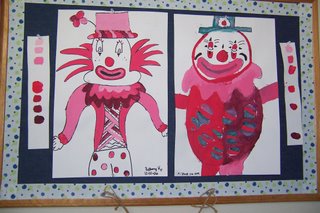 a fun Atelier Art lesson on mixing color shades and drawing clowns
a fun Atelier Art lesson on mixing color shades and drawing clowns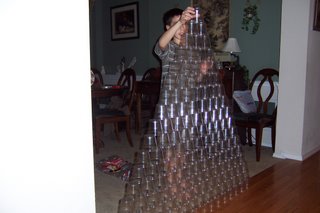 Oh, the fun you can have with a big bag of cups from Sam's!
Oh, the fun you can have with a big bag of cups from Sam's!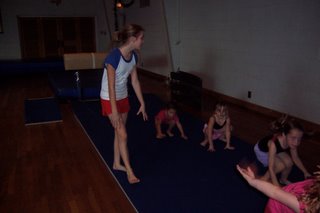 Bethany teaching a weekly tots gymnastics class (if you listen closely you can almost hear them saying "Ribbit!!!")
Bethany teaching a weekly tots gymnastics class (if you listen closely you can almost hear them saying "Ribbit!!!")
 Kyle and his buddies doing an "excavation" at their small science co-op. (Notice they've gridded off their space, are using brushes, and are labeling their specimens. Very official.)
Kyle and his buddies doing an "excavation" at their small science co-op. (Notice they've gridded off their space, are using brushes, and are labeling their specimens. Very official.)
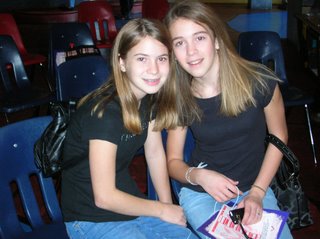 Bethany and her best friend at the laser tag field trip. They got to play laser tag and also had a class about lasers. Fun!
Bethany and her best friend at the laser tag field trip. They got to play laser tag and also had a class about lasers. Fun!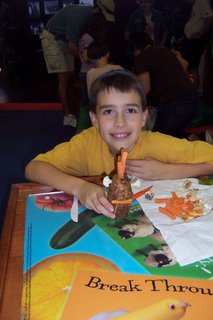 At our state fair, in the Food and Fiber building, making sculptures out of food. Kyle's "punk potato."
At our state fair, in the Food and Fiber building, making sculptures out of food. Kyle's "punk potato."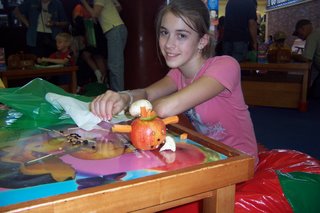 After they made their "food people" they added them to a display of many others that were made that day. They turned out cute!
After they made their "food people" they added them to a display of many others that were made that day. They turned out cute!Yes, we've had our noses in our books, but as you can see we're having a "fair" amount of fun along the way as well. I hope you are, too!
Happy Fall, y'all!